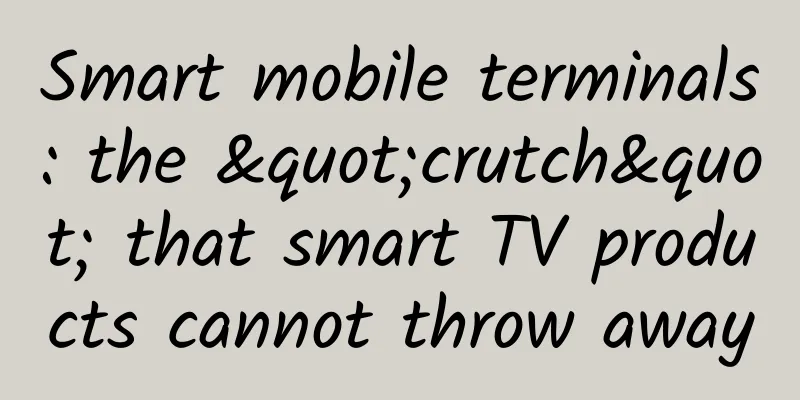Smart mobile terminals: the "crutch" that smart TV products cannot throw away

|
Nowadays, smart TVs have become the category with the highest market penetration rate among TV products. The addition of operating systems has added many new ways to play with smart TVs, making them as interesting as mobile phones. Users also hope to explore more functions of smart TVs, and manufacturers have also grasped this mentality of users and started to "show off" on the TV screen. Among them, the connection between smart TVs and smart mobile devices is also regarded as a major selling point of smart TVs, which can not only solve operational problems, but also give TVs more "fashionable" functions. Initially, the reason why smart TVs were connected to mobile phones was simple: to turn mobile phones into remote controls. Because smart TVs are different from traditional TVs, many page design ideas come from PCs and mobile terminals. Traditional remote controls can only meet users' basic channel switching operations, but if users want to complete more precise selections or inputs in the operation interface, the functions of traditional remote controls are stretched. The best way to solve this problem is touch screen operation, and the best platform for touch screen operation is mobile. Therefore, mobile devices such as mobile phones and pads naturally take on the mission of controlling the TV. At present, the connection between mobile phones and TVs is mainly through the Internet, Bluetooth, and infrared. The most widely used is through the Internet connection. As long as the mobile phone and TV are in the same network environment after the TV application is installed, pairing can be completed, but due to bandwidth limitations, delays or disconnections often occur. Infrared is the most stable, but it requires the mobile phone to have infrared function. Most mobile phones on the market have already eliminated infrared devices, but there are some exceptions, such as Samsung Galaxy S5 and the new Xiaomi 4 mobile phone, which are re-equipped with infrared transmitters. The purpose is also very obvious, making the mobile phone the controller of the entire home appliance. As for Bluetooth connection, although smartphones have this function, TVs equipped with Bluetooth function are not yet popular, so it is not often used. At present, TV games are the most widely used and mature field for mobile phone control of TV. As users' enthusiasm for TV games continues to rise, playing games has become a rigid configuration for smart TVs. However, domestic users' habit of playing free games does not only stop at the game itself, they are even more reluctant to pay for a controller for the game. Of course, domestic game manufacturers are also very considerate, "Since users are unwilling to spend money, we are not afraid of trouble, and we can develop a mobile APP to solve the problem." The idea of turning a mobile phone into a game controller through an Android APP has been unanimously recognized by manufacturers and players. The wish of ordinary players to "not spend money just to play" has been realized, and manufacturers no longer have to go through the trouble of designing, producing or adapting game controllers. Therefore, large Internet companies such as Baidu and Tencent have chosen this approach when entering the TV game industry. In addition to the control function, the mobile terminal also helps the TV to realize more functions. For example, in order to solve the problem of social networking on large-screen TVs, WeChat has also been embedded in TVs by some TV manufacturers. After the mobile phone and TV are used together, functions such as screenshots and posting to Moments and bullet comments can be realized. Some manufacturers consider that users are unfamiliar with TV system operation, and using mobile phones to install applications for TV has become a popular method recently. For example, Baidu TV Assistant and 360 TV Assistant can push the APP on the mobile phone to the TV with one click. In addition, multi-screen interaction has also solved the problem of "difficulty in watching movies" on TV to a certain extent. Although mobile phones can assist smart TVs in meeting user needs in many ways, users also have to face a headache: installing different APPs on their phones. TV manufacturers bring their own APPs. If you want to play racing, you can download the next one. If you want to play chess and cards, you can download the next one. If you want to play somatosensory games, you can download the next one. As a result, the user's mobile phone is full of TV APPs, but the frequency of use is not high. On the other hand, the way of connecting mobile phones to TVs is only limited to young people with "hands-on ability". For older users, let alone installing mobile phone software, it is difficult for them to use a slightly "novel" physical remote control. This has also created a strange phenomenon: as the mobile terminal of the smart TV "crutch", users can easily throw it away because they have not formed a habit of using it. Faced with the cumbersome installation process and problems such as accidental operation, users can just throw it away, as long as the TV can watch programs, it is enough. For manufacturers, it is difficult to get rid of this "crutch". TV manufacturers need to meet the needs of different users, so this function must be available. As for how users use it, that is up to the users. Software manufacturers hope that the mobile terminal will become an entrance to their living room, and bring the popularity accumulated by the mobile terminal to the TV screen through connection. Mobile phone manufacturers have started the "control center" mode, attempting to become the core equipment of the smart home. It is believed that for a long time in the future, the connection between smart TVs and mobile terminals will remain close, and will not be limited to the existing model . Multi-screen interaction is a major trend in the development of smart devices and an important part of building a smart home ecosystem. As a winner of Toutiao's Qingyun Plan and Baijiahao's Bai+ Plan, the 2019 Baidu Digital Author of the Year, the Baijiahao's Most Popular Author in the Technology Field, the 2019 Sogou Technology and Culture Author, and the 2021 Baijiahao Quarterly Influential Creator, he has won many awards, including the 2013 Sohu Best Industry Media Person, the 2015 China New Media Entrepreneurship Competition Beijing Third Place, the 2015 Guangmang Experience Award, the 2015 China New Media Entrepreneurship Competition Finals Third Place, and the 2018 Baidu Dynamic Annual Powerful Celebrity. |
<<: Who is protected by the "protection fee" collected by 21st Century Network?
>>: Practical information: Summary of views from the 4G mobile phone and virtual operator summit
Recommend
Li Yuan Introduction: Where is the nofollow tag applicable?
When doing SEO optimization, in addition to some ...
How to design a bidding page for bidding promotion of a single page?
If you put it this way, I guess not many people w...
If in the future there is a spaceship that can fly one light year in one second, can it fly out of the universe?
This article is based on answering the weird ques...
Weird! Watermelon has grown bean sprouts
Recently, a woman in Kaifeng, Henan, was shocked ...
China Passenger Car Association: The total number of public charging piles in February 2025 will reach 3.83 million, a year-on-year increase of 64%
According to the data analysis of the China Charg...
Which one should I choose between Honor 9i and Xiaomi 8SE? The price-performance ratio is too different, the answer is obvious
You can experience the latest trendy notch screen...
New York University: The brain's memory process is doing data compression. Different graphics also have a common memory format.
How does the brain remember what it sees? Researc...
7 SEM promotion creative title routines, have you used them all?
Internet promotion, especially mobile Internet pr...
Mushrooms can talk, too, and they can say 50 words! No, they're probably just smacking their lips!
Humans are not the only ones in the world who can...
If you’ve climbed a mountain, how can you not understand machine learning?
In today's booming artificial intelligence, i...
China Automobile Dealers Association: Analysis of China's imported automobile market in September 2022
Customs import volume (I) Supply: After three yea...
Accenture: Survey shows companies are reluctant to spend money on AI training for employees
Most corporate executives expect artificial intel...
More legendary than Journey to the West: Xuanzang's Journey to the West
More legendary than Journey to the West: Xuanzang...
"How Much Do You Know About Food Nutrition" Series | Sprouted Brown Rice Improves Type 2 Diabetes, Researchers Analyze the Reasons
At present, many studies have shown that eating b...









